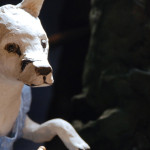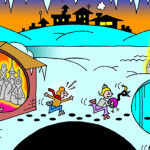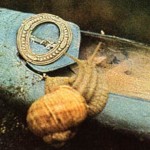IT’S A DOG-EAT-PIG WORLD
IT’S A DOG-EAT-PIG WORLD
Yeun Sang-ho’s KING OF PIGS is a grim animated film about the victims of school bullying
“Ugly, pitiless, and mightily provocative in its representation of human debasement, this satire on class inequality burns like acid.” (Maggie Lee, Hollywood Reporter)
—————————–
 Animated films don’t come much more grim than Yeun Sang-ho’s King of Pigs, the first-ever Korean animated feature to screen at Cannes (it was selected for the Director’s Fortnight in 2012). Its despairing depiction of schoolyard hierarchies and violence is up there with Martin Rosen’s The Plague Dogs, and like that film, it is most certainly not for kids. The $150,000 production (extremely low budget by animation standards) has less in common with the aesthetics of conventional anime than films like Bleak Night (Fantasia 2011) and Yukio Mishima’s The Sailor Who Fell From Grace with the Sea. But the film has a texture and realism that belies its low budget; one wishes more films would follow Yeun’s example, both in terms of delivering confident animation for a fraction of the usual cost, and in its capacity for complex structuring and storytelling.
Animated films don’t come much more grim than Yeun Sang-ho’s King of Pigs, the first-ever Korean animated feature to screen at Cannes (it was selected for the Director’s Fortnight in 2012). Its despairing depiction of schoolyard hierarchies and violence is up there with Martin Rosen’s The Plague Dogs, and like that film, it is most certainly not for kids. The $150,000 production (extremely low budget by animation standards) has less in common with the aesthetics of conventional anime than films like Bleak Night (Fantasia 2011) and Yukio Mishima’s The Sailor Who Fell From Grace with the Sea. But the film has a texture and realism that belies its low budget; one wishes more films would follow Yeun’s example, both in terms of delivering confident animation for a fraction of the usual cost, and in its capacity for complex structuring and storytelling.
The film begins on a reclining, wide-eyed woman’s face; as the camera pans back we see that she’s been murdered, slumped over a table. To her levitra without prescription ottawa right is a doorway where a man is showering. As the man exits from the bathroom and glances impassively at the woman’s body – later revealed to be his wife – a shadowy figure lectures and encourages him, then emerges from the darkness to reveal a mutated pig face. The man, Kyun-Min, a 30-something businessman, phones up an old schoolmate he hasn’t seen for over almost 20 years, and invites him for a drink to catch up. Jong-suk, the schoolmate, is now a struggling writer, taking on creatively undignified ghostwriting gigs until he can find buy cheap lasix a publisher for his novel. Like Kyun-Min, Jong-suk takes out his self-loathing on his female partner, beating and kicking her while making jealous accusations.
The two men hide their emotional turmoil as they meet and start to reminisce, but their schooldays – revealed through flashbacks that will dominate the film – were hardly freewheeling and fun. Their close friendship in those years was founded on mutual trauma, both having been routine punching bags for their more privileged, wealthy schoolmates. As is repeated frequently throughout the film, the rich kids – those who have all the advantages and will grow up to be in bosses and executives – are the ‘dogs’, and the more financially restricted counterparts are the losers, the ‘pigs’. The pigs have gotten price viagra used to the way things are. The dogs are always going to be at the predators at the top, and the pigs are always going to be eating shit at the bottom. That is, until Chul appears. Chul is the quiet psycho who sits unengaged at the back of the class – they don’t even seem to know how long he’s been there – and he becomes ‘King of the Pigs’ by his violent refusal to comply with the school hierarchy. He brutally and fearlessly strikes out against the dogs with no fear of reprisal or scholastic suspension.
Aside from the obvious nods to William Golding’s Lord of the Flies, the dogs-versus-pigs metaphor has also drawn comparisons to Shohei Imamura’s films; from Pigs and Battleships (1961) through the Ballad of Narayama (1983) and beyond, Imamura has often used animal analogies for human behaviour. “I like to ask myself what differentiates human beings form other animals,” Imamura said in an interview. “What is a human?” But Chul has the answer: “Knives distinguish human beings from animals” he says. “We need to be monsters if we don’t want to keep on living like losers.” He teaches them to stab and lash out, to channel and deflect their anger, and (like the gang of 13-year olds in Mishima’s The Sailor Who Fell From Grace with the Sea) they each participate in stabbing a cat. The image of bullied children thinking a knife will end their troubles also recalls Tomas Alfredson and John Ajvide Lindqvist’s sombre Let the Right One In (2008).
Brief moments depicting Chul’s homelife help explain his temperament (which – combined with the ‘pig’ persona – nods to the tragic lead of Neil Jordan’s The Butcher Boy), but his anger is contagious and intoxicating – and also corrosive, which is beautifully depicted in a terrifying hallucination sequence that follows the huffing of solvent. While under the influence, feeling mighty and monstrous, Chul hatches a plan – a plan that will teach all the dogs a lesson they will never forget.
King of Pigs is a rough ride; a scathing indictment of the class system that perpetuates schoolyard (and later workplace) bullying, full of realistic violence and humiliation with few moments of hopefulness. Its message is that adaptation and survival require inhumanity and cruelty, a process whose only end can be a bleak existence not really worth living – and this is a wall many of its characters come up against. But as director Yeun Sang-ho has said in an interview, the character of Chul is, above all, a question. And the cat, still bloody from the secret afterschool mutilation – will return as the spectre of culpability, mocking Chul’s proteges as they try to shed their humanity, thinking that it is the only answer to this question.
——————————
KING OF PIGS screens on July 26 at 7:30pm in the Hall theatre. For more info on this film, see the event page HERE.

 July 26, 2012
July 26, 2012  No Comments
No Comments









